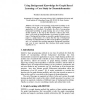Free Online Productivity Tools
i2Speak
i2Symbol
i2OCR
iTex2Img
iWeb2Print
iWeb2Shot
i2Type
iPdf2Split
iPdf2Merge
i2Bopomofo
i2Arabic
i2Style
i2Image
i2PDF
iLatex2Rtf
Sci2ools
117
click to vote
IMECS
2007
2007
Using Background Knowledge for Graph Based Learning: A Case Study in Chemoinformatics
The benefit of incorporating background knowledge in the learning process has been successfully demonstrated in numerous applications of ILP methods. Nevertheless the effect of incorporating background knowledge in graph learning has not yet been systematically explored. A first step in this direction is taken in this work, where a case study in chemoinformatics is presented, in which various types of background knowledge are encoded in graphs that are given as input to a graph learner. It is shown that the type of background knowledge encoded indeed has an effect on the predictive performance, and it is concluded that encoding appropriate background knowledge may even be more important than selecting which graph learning algorithm to use.
Background Knowledge | Graph Learning | IMECS 2007 | Knowledge In Graph | Theoretical Computer Science |
Related Content
| Added | 29 Oct 2010 |
| Updated | 29 Oct 2010 |
| Type | Conference |
| Year | 2007 |
| Where | IMECS |
| Authors | Thashmee Karunaratne, Henrik Boström |
Comments (0)

